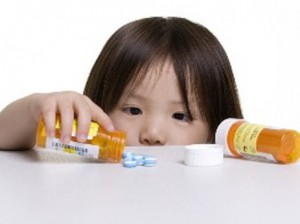Child Accident Prevention
Nothing can be more tragic than a child getting hurt or dying due to accidents. If the parents are a bit more careful, many accidents can be prevented. Children most at risk from a home accident are between the age group 0-4 years. Children, particularly below 3 years have little sense of danger or self-preservation and thus are wholly dependent on adult supervision for their safety. Most of the accidents can be prevented by increasing awareness and making the home safe for the kids. Household injuries are one of the top reasons for kids under the age of 3 years getting hurt. Young kids have the highest risk of being injured at home because that’s where they spend most of their time.
Here are some simple guidelines for prevention of accidents. However; the best guideline is common sense of the parents, who should have a sense of anticipation of danger. For example: if you see your child moving towards a hot cup of tea placed on a table, immediate danger signals should flash through your mind that the child may accidently put his fingers in the hot tea or pour the hot cup of tea on itself.
Prevention of Choking / Suffocation 
- Do not give the child any big food or any other item like nuts, buttons, beads, popcorn etc., particularly round things, that the child can put into his mouth as a whole, as there is a danger that the child may choke upon it. You need to be very careful until your child is old enough to chew or spit out such things (usually 4 years of age).
- Do not allow your child to play or run around with food in the mouth.
- Be very careful with toys. Avoid giving your child toys having small detachable parts. Always try to buy toys that do not have detachable parts.
- Don’t allow the child to put sharp objects particularly sharp pencils in the mouth. Although your child most likely won’t choke on it, however; there is a risk that the sharp point may puncture the area near the tonsils, which can lead to further medical complications.
- Be on the watch if the child is playing with a plastic bag. He may cover his head and face with it leading to suffocation.
- Long strings, threads etc. can be dangerous. Accidentally the child may entwine the piece of cord around his neck leading to choking.
Prevention of Burn including electrical
 Majority of the burns in a child are caused by hot liquids. Common offenders are food, beverages and hot geyser water in the bathroom. Here are some tips to prevent these:
Majority of the burns in a child are caused by hot liquids. Common offenders are food, beverages and hot geyser water in the bathroom. Here are some tips to prevent these:
- Never drink anything hot while holding a baby. The hot liquid may accidently spill over the child and you causing burns.
- Keep matches, lighter etc. out of reach of the children.
- Have a fire extinguisher handy at home.
- Avoid using tablecloths or mats that a child can pull off the table and so cause any hot liquids kept on the table spill over him.
- When you are ironing cloths, never leave it unattended. If you have to do something else in the midst of ironing, make sure the iron is out of reach of the children.
- Always cover the electrical outlets. A child loves to plug and unplug things in the electrical outlets. Tape tightly any joint or naked wire. Replace worn out cables.
Prevention of drowning:
 1.Never leave a child under 3 years unattended in the bathroom; even, in a bathtub. They can drown in that small an amount of water also.
1.Never leave a child under 3 years unattended in the bathroom; even, in a bathtub. They can drown in that small an amount of water also.
2.Never leave a child unattended near a swimming pool. Children are not “water safe” before the age of 3 years. So if you wish to teach your child swimming, start swimming lessons only after the age of 3 years.
3.Household water storage systems like tanks, drums etc. should be out of reach of your child.
Prevention of accidental poisoning: 
- Keep all the medicines out of reach of the children. Dispose off all the open tablets, capsules etc. Close the cap of all medicine bottles tightly.
- Discard all old, used and expired medicines.
- Never use medicines from an unlabelled or unreadable container.
- Always store the medicines in their original containers. Do not transfer or keep the medicines in food or beverage containers.
- Drugs and medicines are not the only source of poisoning. Chemicals, insecticides, petrol, kerosene, all sorts of house cleaners etc. are things which the child can ingest. Keep them at a safe place that is out of reach of the children.
- Always check the expiry date of the medicine before giving it to your child.
Need to know how to keep your child safe and secure at home. Follow our child safe section where you can get necessary ‘Child Safety Tips‘.








 Majority of the burns in a child are caused by hot liquids. Common offenders are food, beverages and hot geyser water in the bathroom. Here are some tips to prevent these:
Majority of the burns in a child are caused by hot liquids. Common offenders are food, beverages and hot geyser water in the bathroom. Here are some tips to prevent these: 1.Never leave a child under 3 years unattended in the bathroom; even, in a bathtub. They can drown in that small an amount of water also.
1.Never leave a child under 3 years unattended in the bathroom; even, in a bathtub. They can drown in that small an amount of water also.

























